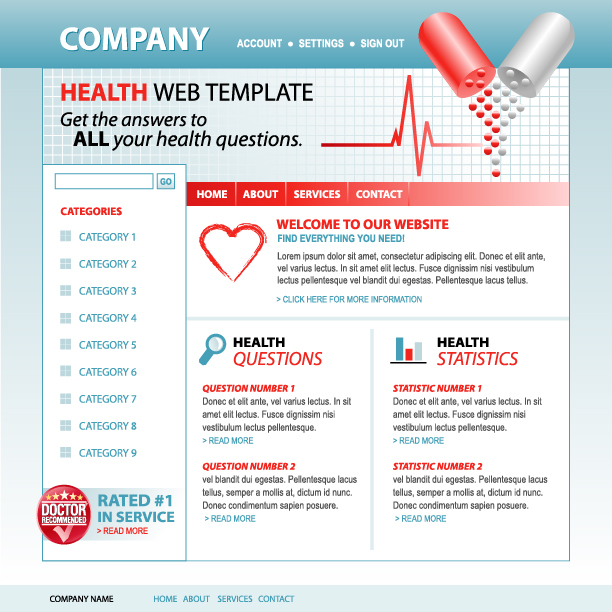 |
|||||
|
|
Winter 2014 Is There a Role for Cell Phone Applications in the Self-Management of Asthma? Finding Patient-centered Resources on the Medicare Consumer Websites Parents Need Training in Inhaler Technique Is Social Media the Patient's Friend? RT Students Impact Patient Care During a Medical Mission to the British Virgin Islands Asthma and Allergies Linked to ADHD in Boys
|
|
|
Finding Patient-centered Resources on the Medicare Consumer Websites
by Cheryl West, MHA Occasionally I bring to light various government programs or information sites that can provide important information to both respiratory therapists and pulmonary patients. Sometimes the shear breadth of information or resources available on the Internet can become overwhelming, and the accuracy of the information can be questioned. In particular, when researching what state or federal health services are available for patients, it is advisable to first review official government websites — noted by the “.gov” suffix. This article will focus on the patient-centered resources the Medicare Program offers to Medicare beneficiaries. While the information is from the Medicare website, it most certainly isn’t useful only to Medicare beneficiaries. Anyone needing a hospital, nursing home, rehabilitation facility, home health agency, or a physician will find quite valuable what Medicare has tucked away on its consumer site. MyMedicare.gov Medicare actually has two websites. One Medicare website is for providers, professionals, and policy makers — and that’s www.cms.gov. The other Medicare website is set up to help make the complex Medicare system benefits — including Part A (hospitals and skilled nursing facilities), Part B (physician and outpatient, HME, etc.), Part C (managed care option), and Part D (prescription drugs) — more comprehensible. That website is located at www.mymedicare.gov. While the main page of this website makes a very large effort to get you to sign up and sign in, you can skirt around that to find information you or the pulmonary patient could find very useful and enlightening. The health care system, mostly pushed by changes in the vast federal Medicare program, has been turning slowly to focus on the quality of the care that is being provided rather than the quantity of care provided. Using quality standards and measures that have been developed, vetted, and are now accepted as reliable, Medicare is using these measures to track just how well providers are doing. Medicare first focused on hospitals; and by initially meeting certain Medicare standards, hospitals were rewarded with slightly higher Medicare reimbursements. Now that’s transitioning from a Medicare reimbursement reward to a Medicare financial penalty if standards are not met. The “compare” websites With quality measures being reported by hospitals to CMS, the agency did not keep this information to itself. It launched the first of the “compare” websites at www.medicare.gov/hospitalcompare/search.aspx. By simply entering the zip code for the search area you are interested in, all the hospitals in that zip code pop up, and you can select facilities to compare how each hospital fares in meeting the measures set by Medicare. Those measures range from how many Medicare patients were treated per diagnosis (including a category for “lung disease”), to how the hospital was rated based on patient satisfaction surveys, to information on readmission rates, complications, and deaths. A person may have less maneuvering room to pick a hospital to go to for a number of reasons, like their personal physician may not have admitting privileges at a hospital that is their preference. However, patients do have more choice in selecting their own doctor: and Medicare now has a compare site for physicians: www.medicare.gov/physiciancompare/. The Physician Compare site does not currently report on meeting specific quality standards, but it does note a physician specialty, type of practice, medical school, and residency information. Medicare is beginning to phase in quality measures for physicians, and it’s a safe bet that in the near future the Physician Compare site will report on those as well. Individuals may have less choice selecting other types of facilities they may require for their health care needs and are reportable on other Medicare Compare websites. Nevertheless, information from these sites can be quite useful when a patient, family, or caregiver considers a particular facility. So consider these compare sites as well: • Home health agency: www.medicare.gov/homehealthcompare/ Quality measures are different for each type of provider. For example, Nursing Home Compare asks about staffing, something Hospital Compare does not do. On the other hand, Hospital Compare gets more disease-specific with information (for example, on effective pneumonia care). As noted earlier, while all this comparison information is on the Medicare website, it clearly can be applied and be very useful for non-Medicare patients wanting to make informed choices on where to get their care if they have the option to do so. Finally, if you are really interested in knowing the genesis of where these standards and measures came from and are now being used in the various Medicare Compare sites, check out the National Quality Forum (NQF) at www.qualityforum.org/Home.aspx, which is a not-for-profit private sector standard-setting organization whose efforts center on the evaluation and endorsement of standardized performance measurement. The standards endorsed by the NQF are not the only entity Medicare uses in selecting its required reporting measures, nor does Medicare use all the measures endorsed by the NQF, but if you want to have a good feel for what standards might be used in the future, the NQF measures will certainly give you a sense of that future. I wish you happy hunting and all the success in finding the valuable information you seek. Cheryl West, MHA, is the director of government affairs for the American Association for Respiratory Care in Irving, TX. |
|

